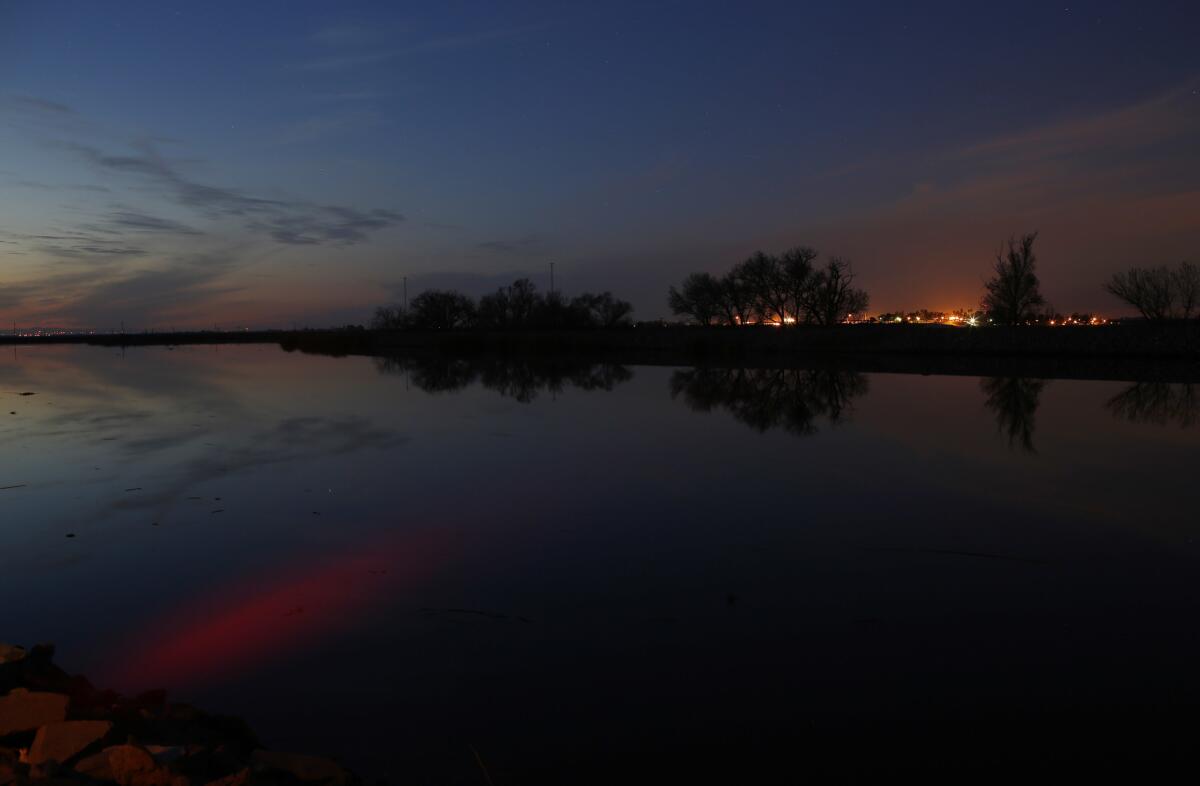Last-minute push for California drought legislation creates friction between Feinstein and Boxer

- Share via
House Republican leaders and California’s senior senator announced Monday a new attempt to pass legislation that would increase water deliveries to San Joaquin Valley agribusiness and Southern California.
The 90-page proposal was added to a water infrastructure bill that Congress is expected to vote on this week before adjourning for the rest of the year.
The deal sets Sen. Dianne Feinstein (D-Calif.) on a collision course with her colleague, Sen. Barbara Boxer (D-Calif.), who blasted the proposal as a poison pill and vowed to do everything she could to stop it, including halting all action in the Senate unless it is removed.
The last-minute agreement is reminiscent of what happened before Congress adjourned December 2015, when the 14 Republican members of the California delegation added what they called compromise language to a must-pass bill. Feinstein was furious, saying she hadn’t signed off on the plan, which skipped over the normal legislative process.
She filed her own water bill in February, and the language inserted Monday largely mirrors what she proposed then. “I think this is the best we can do,” after three years of negotiations and dozens of versions that have failed to make it into law, Feinstein said in a statement.
Described as drought relief, the proposal focuses on environmental restrictions that have at times limited water deliveries from the Sacramento-San Joaquin Delta to the San Joaquin Valley and Southern California.
“The timing of this deal is critical — we cannot afford to miss capturing water from storms during this wet season,” House Majority Leader Kevin McCarthy, who represents portions of the San Joaquin Valley, said in a statement announcing the agreement.
Northern California Democrats and environmentalists condemned the language as an end-run around Endangered Species Act protections for salmon and the nearly extinct delta smelt. The proposal would override “science to redirect water into the hands of the most powerful corporate farmers in the world,” argued Rep. Jared Huffman (D-San Rafael).
Generally seen as an ally of Central Valley agriculture on water matters, Feinstein said she had consulted with state and federal agencies to ensure the proposal would comply with environmental laws and fish protections.
But opponents pointed to sections that deal with operation of the federal and state water projects that draw supplies from the delta, the hub of California’s water works.
One provision, for example, would let managers exceed the environmental pumping limits to capture more water during storms. Those limits have been a pet peeve of water contractors, including the Westlands Water District and the Metropolitan Water District of Southern California, which complained of water supplies “lost to the sea” during last winter’s storms.
“The agencies have been hyperconservative” in setting pumping limits, said Jeffrey Kightlinger, Metropolitan’s general manager. “This would urge them to use their discretion” to favor more water exports.
Federal biologists have said the delta flows are vital for native fish, which have suffered devastating losses during the state’s prolonged drought, and help maintain the quality of the delta’s fresh water supplies.
The Water Resources Development Act, which authorizes water projects across the country, was drafted by Boxer and Sen. James Inhofe (R-Okla.). Different versions were passed by the House and Senate in the fall, and both chambers must vote this week to reconcile the two bills.
Speaking to reporters Monday afternoon, Boxer said inserting the drought language into the House version was “a devastating maneuver.”
The legislation boosts several California programs, including the Los Angeles River cleanup and Salton Sea restoration. But Boxer said she wouldn’t tolerate the drought language, which she argued puts the interests of big farms over the fishing industry and undermines endangered species protections.
“There is no place for that as long as I am breathing,” Boxer said, stressing that she is not going to end her 24 years in Congress by allowing changes to the Endangered Species Act.
“They are not playing a game with someone who will not play hardball. I will not allow this to come forward without a fight,” Boxer said. “There is time to fix this; all they have to do is take out this harmful poison pill.”
[email protected] | Twitter: @sarahdwire
[email protected] | Twitter: @boxall
ALSO
Supreme Court appears in favor of ruling against racial gerrymandering in GOP-controlled states
Warning about plot to blow up Universal City station prompts heightened security across L.A.
Proposal to allow roadside testing for marijuana use is revived
More to Read
Get the L.A. Times Politics newsletter
Deeply reported insights into legislation, politics and policy from Sacramento, Washington and beyond. In your inbox three times per week.
You may occasionally receive promotional content from the Los Angeles Times.











